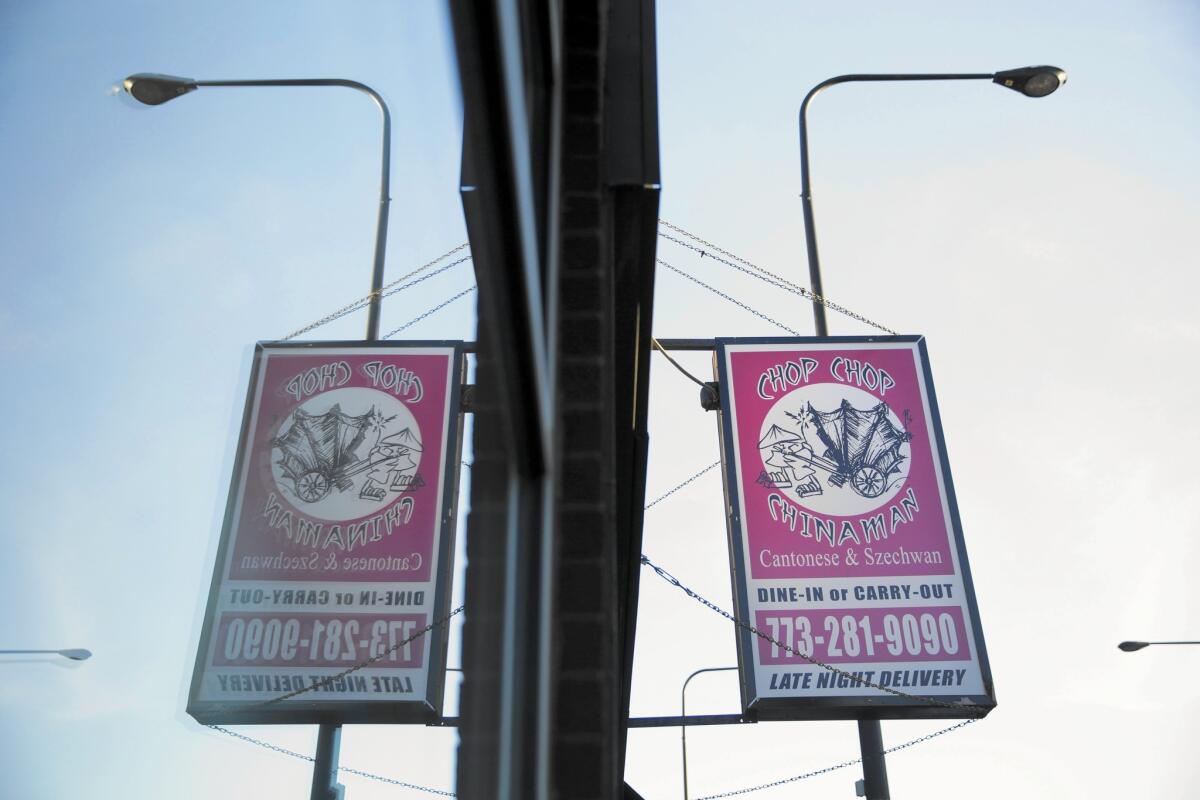Chop Chop Chinaman restaurant’s name sparks vandalism, debate in Chicago

Chop Chop Chinaman restaurant’s owner is three-quarters Chinese and doesn’t consider the name offensive.
Reporting from Chicago — The evening of Feb. 17 was an otherwise quiet one for Chicago Police District 19. The incidents report showed a motor vehicle theft and an attempt to cash a counterfeit check.
Then came HY154977 at 5:56 p.m. The offense: criminal damage to property at a restaurant on the 3300 block of North Halsted Street. The weapon used: a free sample of Nars lipstick.
At the root of the matter is one word: “Chinaman” — a word that, depending on whom you ask, is a slur, or just a catchy name for a newly opened Chinese restaurant, in this instance Chop Chop Chinaman.
For Larry Lee, who is 46 and three-quarters Chinese (his mother is Chinese Italian), the word is ingrained in his vocabulary. His father owned a number of restaurants, including three called Mr. Chop Suey, in the ‘80s and ‘90s. Lee remembers the word “Chinaman” being tossed around with chummy affectation.
And in a restaurant landscape littered with “bamboo,” “jade gardens” and “palaces,” Chop Chop Chinaman surely stood out.
“You have to take the risk,” Lee said. “The one who kills the rabbit, eats.”
On the other side of the case is 26-year-old Jeannie Harrell, who works in the book publishing industry and has no previous criminal history. She lives a few blocks from the restaurant and spotted the sign when she was walking home.
“I thought, ‘Who thought this was a good idea?’” said Harrell, who is half-Japanese and was raised in Tokyo. “What business would want that kind of attention, and why would they want to make our neighborhood look that way?”
The word long had a neutral to pejorative connotation, used in popular idioms (“a Chinaman’s chance”) to points of geography (the Hawaiian islet Chinaman’s Hat).
But in time, said Northwestern University’s Andrew Leong, political activism and the rise of Asian American literature pushed words such as Chinaman and Oriental out of favor.
“I can imagine people the 1940s and ‘50s using that word without being offensive,” said Leong, an assistant professor of Asian languages and cultures and English. “But in the ‘70s there was an awareness of the historical ill use of that word, and that was a real consciousness shift.”
For Harrell, by Feb. 17 she’d had enough. She wanted to vandalize Chop Chop Chinaman, she tweeted at 5:46 p.m., but “only have nice NARS lipstick to write with.”
Inside the restaurant, Lee was tending to business when a server called him over. A woman was scrawling on the window. Lee said that as the woman walked away, she looked at him, her hand raised and clenched but for one finger.
The message was an arrow pointed to the restaurant logo, a man wearing wooden sandals and a coolie hat pulling a rickshaw. In crimson lipstick it declared the name a “hate crime,” dropping an F-bomb for emphasis.
When a friend asked whether she had photographic evidence, Harrell tweeted back: “Not wise to return to scene of crime but oh well.” She posted a picture of the lipsticked window.
Lee called police.
If not for Twitter, the case might have remained unsolved and forgotten.
But Lee tracked down Harrell through social media and pressed charges. Lee said the logo had to be scraped off and replaced at a cost of several hundred dollars.
“What’s to stop the next person to throw a brick through the window?” Lee said.
Ten days after the incident, Harrell was sitting at home on a Friday night, in her pajamas, when someone knocked on her door. It was the Chicago Police Department.
She was led to a squad car and driven to the restaurant, where Lee identified her as the culprit. She was handcuffed, fingerprinted and kept in a holding cell till 2:30 a.m.
“So remember how I vandalized that racist restaurant with lipstick?” she tweeted on Feb. 28. “Anyway I just got out of jail and I now have a court date.”
Matters escalated after Harrell shared her story with a neighborhood news website. That day the restaurant received a few dozen prank phone calls. Lee said one man called the restaurant 32 times and told Lee, “Watch your back.” Another prankster claimed to be from the Ku Klux Klan and tried to goad Lee into saying something inflammatory against the Chinese.
In person, Lee speaks in measured tones about how his mixed heritage codified his views on ethnicity. As someone who wasn’t fully Chinese and grew up around Chinese children, he became the butt of jokes. He speaks cogently on the Chinese Exclusion Act — the 1882 federal law that restricted the flow of Chinese immigrants into the United States — and how his elders endured its effects. The people on Yelp crying racism, Lee said, were selective about their outrage.
“I’m not calling anyone a Chinaman. But everyone is pointing at me and calling me racist, and it’s people who hide behind a computer,” Lee said. “How am I racist? I employ two Chinese cooks and a Hispanic server. My neighbors don’t have a problem with the name.”
Harrell felt a backlash too. On her employer’s Facebook page someone suggested she be fired.
On one level, she can empathize with Lee. Classmates taunted her mixed-race heritage, with one boy calling her a slur. “My point is, if I can prevent one Asian kid from being called Chinaman, I’d be happy with that,” Harrell said.
Her court date is April 8. She has been charged with criminal damage to property (under $300), a class A misdemeanor that carries a possible $2,500 fine and up to one year in jail.
“I’m a bit scared, but I think I’ll be fine,” she said. “What I did was so minor, in terms of the damage I did, relative to someone putting up something that is aggressively racist. I don’t think anyone should be imprisoned for a problem Windex solves.”
She has since set her social media accounts to private.
More to Read
Sign up for Essential California
The most important California stories and recommendations in your inbox every morning.
You may occasionally receive promotional content from the Los Angeles Times.










